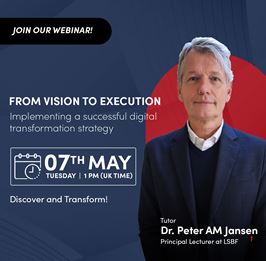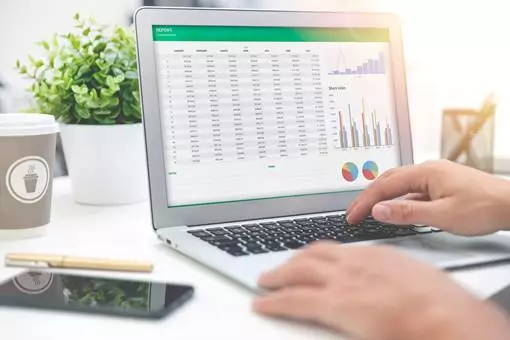The Partnership of Accountants and Data Scientists make for a Successful Formula
- 13th January 2020
- Written by LSBF Staff
- Opinion & Features

The accountancy sector is changing as a result of the introduction of automation and the expansion of data analytics. Not only have these two factors led to an increased amount of data for accountants to use, but they have also meant that risk management and decision-making can be performed with a significant amount of insight. Therefore, many accountants have begun to team up with data scientists to make sense of the vast amounts of data available to them.
Find out more about how data analytics are being used in the accountancy sector as well as what the future of working in the industry might look like.
The importance of data analytics in accounting
In 2017, The Economist described data as the most valuable resource in the world, giving it precedence over oil, a highly precious commodity. This not only demonstrates the usefulness and power of data technology, but hinted that capitalising on it could prove imperative for the accounting industry.
Currently, many financial institutions and internal audit functions are using data analytics, data governance and data science. Accounting firms are exploring the opportunities of data analytics leading to an increase in jobs in the industry.
According to IBM’s Leon Katsnelson, Director and Chief Technology Officer For Strategic Partnerships - Data Science, accounting firms need to expand their understanding of data. Katsnelson holds the opinion that technology is changing the way companies process information which puts accountants in a position to facilitate this transition.
An inter-lapping role
Big data has caused accountants and data scientists to work collaboratively, meaning both parties have been able to develop a range of skills that have improved business revenue and processes.
The commercial skills that accountants possess has enabled a merger of data science and business. Extensive training has allowed accountants to utilise data to make decisions. Similarly, data scientists will study a dataset to work out how it can be utilised in a business context.
However, currently, organisations are still at an experimental stage when it comes to data usage. Data scientists are still investigating different methodologies and how these can be used to generate meaning from a dataset.
Collaboration of data scientist and accountants
The profession of accounting is very progressive and complex particularly where technology is used to asses large amount of information. Big data plays a pivotal role in strategy and decision-making. While accountants have a good knowledge of finances, data scientists bring in analytical knowledge to better identify financial reporting and other operational risks.
Today’s accounting and finance software tools are robust and highly functional. Intelligence tools are required to analyse multiple aspects of a business. This valuable information, if analysed properly, can generate revenue and profit.
Careers in big data accounting
The role of data scientists and accountants have merged which has given shape to new job profiles. Accountants who are accustomed to working with big data have a lot to gain from this industry mutation. According to a recent survey in the *USA, 59% of finance and accounting managers consider data analytics to be a mandatory skill requirement of the coming times.
Many professionals are choosing to enrol on courses to develop new knowledge and obtain better job prospects and pay packages. Degrees that combine big data technologies with accounting, are becoming highly sought after as they prepare individuals for job roles such as forensic accounting as well as new technology-oriented methods of performing auditing and financial planning.
New age auditors are shifting from sample-based models to continuous monitoring, which enables an analysis of larger data. Likewise, financial advisors use big data to understand the market and consumer behaviour.
*(Resource: Acquitymag)
Rising need for data scientists
As more businesses start using big data, the need for data scientists will grow. Currently, the sector is experiencing a shortage of talent making it an exciting time for those looking for job opportunities.
“The Dynamics of Data Science Skills”, a report by the Royal Society published in May 2019, described that the demand for employees with specialist data skills had gone up by 231% in the last five years. Therefore, it is not only imperative that individuals start pursuing courses and an education in big data, but also shows that businesses without capable employees could be at a disadvantage.
How can data science benefit a finance department?
Data science can be a valuable asset within a finance department as it can help individuals to better understand their limitations as well as a business's problems. Big data can assist in forecasting the future of a market, establishing trends and patterns as well as understanding the needs of customers. For example, one valuable tool businesses are currently using is algorithm decision-making.
Predictive accounting is another influential product of data merging in the field of accounting. Several chartered accountants often face increased competition in the form of bookkeepers to bigger firms. With the help of predictive accounting, they can add value to their client and get the necessary edge in business.
Data science has become an integral part of business. If you are considering pursuing this subject area as a career, London School of Business and Finance offers the CPD-accredited Data Science for Executives programme. Find out more about the programme.
If you are considering pursuing this subject area as a career, London School of Business and Finance offers a free Data Science course for students who book 4 or more ACCA courses, find out more. Terms and conditions apply.
This article is written by Nandita Kaushal and edited by Emma Chadwick.
Other Opinions and Features
The Rise of Mobile Accounting
Accounting has always been a field that’s associated with piles of paperwork, spreadsheet and staggering numbers. Using computers to carry…
What will the role of the CFO look like in the future?
The CFO role is often thought of as being largely preoccupied with numbers and data, but in the last few…
7 Myths About Accountancy
Wondering what accountancy is really like as a career? Many people think that being an accountant is just number crunching…



